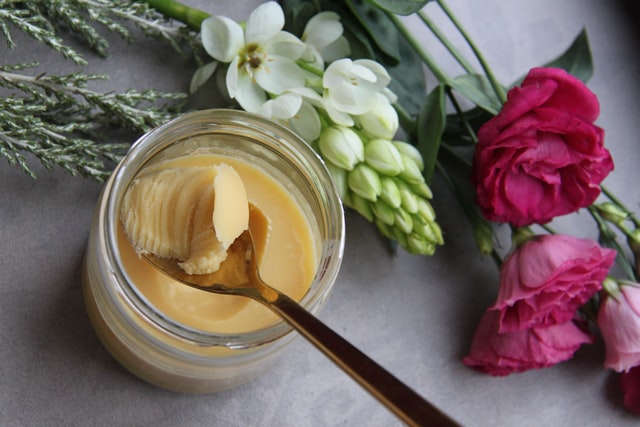
Ayurveda is often referred to as the sister science to Yoga. It translates to “the science of life” and revolves around two main principles:
- Nothing has more power to heal and transform the body than the mind.
- The mind and the body are intricately connected.
This ancient school of medicine suggests that everything is composed of the five elements: Earth, Water, Fire, Air, and Space. Each one of us possesses a balance of these elements in varying degrees, which manifests through three major metabolic types or Doshas: Vata, Pitta and Kapha. Every individual is unique and is usually a combination of the three doshas in different degrees. Whatever one’s dosha type is, there are a few time-honoured lifestyle prescriptions to help us blossom throughout the year, and especially during the winter months.
Morning Mantra Number 1: Scrape and Swish
Tongue scraping and Oil pulling or “swishing”. Tongue scraping clears toxins, bacteria, and dead cells from the tongue, thus preventing bad breath. Current scientific research suggests that the daily practice of oil pulling can prevent gum diseases like gingivitis and cavities. When combined with our regular dental health care routine, the prescriptions to “scrape and swish” can be a fabulous and simple addition to our daily morning mantras.
The perfect “swish” prescription given to me by my Nani (maternal grandma) – measure 1 tablespoon coconut oil, 2 drops clove oil, and ½ teaspoon sesame oil. Swish this away in the mouth. Pull it all around your gums and into your teeth for around 20—25 swishes (please do not swallow). After the swish, spit in the trash. Remember to be mindful as spitting this into the drain can later clog up your pipes.
Morning Mantra Number 2: Hug in a mug
Ayurveda suggests that we are as strong as our “Agni” digestive fire. A strong digestive fire and gut health is directly linked to our overall immunity. Hence, every morning on waking up – drink a large mug of warm water with ½ a teaspoon of fennel seeds if you lean towards indigestion. Or with ½ a teaspoon of grated ginger if you have an upset tummy.
Ritucharaya Rhythms
Ayurveda further emphasises the theory of observing a seasonal routine—Ritucharya. Aligning with the rhythms of nature can grant us optimum health during the changing seasons. So, in winter when the weather can be cold, rough, and windy, we should consume foods that are the opposite to balance out the effects of the season.
For example, in autumn and winter:
- Favour warming soups made with seasonal vegetables, such as pumpkins, sweet potatoes, and carrots.
- Use more healthy fats like coconut oil, ghee, and olive oil.
- Slow sip on warming spiced teas laden with turmeric, cumin, black pepper, ginger, cinnamon, and fennel.
The Magic of Movement
It is essential not to be cooped up indoors due to the cold weather and the restriction on movement. Bundling up well and opting for a safe walk outdoors whilst connecting or meditating with nature may be the answer to fighting those winter blues away. Walking is an overall exercise that can help balance the mind and body with calm and ease. Some Ayurvedic experts suggest that walking after meals aids the digestive process and supports our “Agni” or digestive fire.
Listen to the Inner Rhythms
We all possess an innate inner cycle known as the “circadian rhythm”. Ayurveda encourages us to align ourselves with this internal rhythm and the outer earth in relation to our sleep-waking cycle, and diet and exercise. A general guideline that we may like to follow is –
6 AM: Rise and shine. A time to go slow and be gentle with ourselves.
7 AM – 10 AM: Morning mantras, meditation, and light yoga
10 AM – 2 PM: This is generally the most productive time of the day to run errands, do tasks, or intense exercise. We must have a big lunch around noon when our digestive fire is at its peak.
2 PM – 6 PM: Start to slow down and listen to your body, maybe a small rest, and complete tasks that are easier to do. Prep a light dinner to consume before 6.30 pm.
6.30 PM – 10 PM: Ideally we should be curling up in bed by 10 pm, so as the sun begins to go down, we can start to unwind ourselves by opting for gentle yoga stretches, an Epsom salt, or an aromatherapy oil infused bath with candles followed by soft music and light meditation.
10 PM – 2 AM: This is time to fully unwind with a nice warm, soothing herbal tea like chamomile. Cozy up for the night with gratitude and affirmations. Ayurveda believes this time is vital for rejuvenation, rest, and digestion. If unwinding is an issue, perhaps a hot mug of “golden milk” just like grandma used to make may just do the trick.
Following just a few of these Ayurvedic prescriptions along with being in sync with the year’s seasons, sunrises and sunsets, are wonderful ways to get organised to boost our general health. If you are new to Ayurveda, do not despair. Go slow, take baby steps over a short period, and the results are sure to amaze you.
Read another article by Seema Bhatia
Share
Picture Credit : Megumi Nachev on Unsplash

Thank you so much I really loved going this piece 🙂